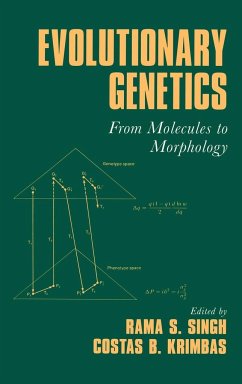Richard Lewontin is undoubtedly one of the most distinguished evolutionary biologists of our time. He has contributed to science not only by his own work on evolutionary theory and molecular variation and by his influence on the many young scientists who have worked with him but also by asking us to think about the relationships between the science we do and that world we do it in. Sciences in general, and the life sciences in particular, need their own critic, and Lewontin has been an untiring critic of science and its relevance to society. This collection of essays is produced in honor of Lewontin's 65th birthday. The volume is unique as it has a comprehensive coverage of modern evolutionary genetics from molecules to morphology by a group of star authors, including his students and colleagues. The areas covered are: the mathematical and molecular foundations of population genetics, molecular variation and evolution, selection and genetic polymorphisms, linkage and breeding system evolution, quantitative genetics and phenotypic evolution, gene flow and population structure, speciation, behavior, and ecology. The volume brings out the central role of evolutionary genetics in all aspects of its connection to evolutionary biology and is a must for all graduate students and researchers in evolutionary biology.
Table of contents:
List of contributors; Preface Rama Singh and Costas Krimbas; Part A. Population Genetics: Problems, Foundations and Historical Perspectives: Introduction Costas Krimbas; 1. The problem of population genetics Richard Lewontin; The mathematical foundations of population genetics W. J. Ewens; 3. A natural historian's view of heterosis and related topics Bruce Wallace; 4. The molecular foundation of population genetics Rama Singh, Walter Eanes, Donal Hickey, Margaret Riley, Lynn King; Part B. Molecular Variation and Evolution: Introduction Marty Kreitman; 5. Population genetics and evolutionary genetics of codon bias Marty Kreitman and Marcos Antezana; 6. Gene conversion is a major determinant of genetic diversity at the DNA level Andrew Berry and Antonio Barbadilla; 7. Evidence for balancing, directional, and background selection in molecular evolution Steve Schaeffer and Montse Aguade; Part C. Selection and Genetic Polymorphisms: Introduction Phil Hedrick and Tim Prout; 8. Aspects of fitness Freddy Christiansen and Tim Prout; 9. Opposing selection Tim Prout; 10. Analysis of selection in laboratory and field populations Einar Arnason and Stuart Barker; 11. Genetics of complex polymorphisms: parasites and maintenance of the MHC variation Phil Hedrick and Timothy Kim; 12. The population biology of antibiotic resistance Bruce Levin; Part D. Linkage, Breeding Systems and Evolution: Introduction Ian Franklin; 13. The equilibrium theory of one and two locus systems Ian Franklin and Marty Feldman; 14. Inversion polymorphisms in Drosophila Costas Krimbas and Jeff Powell; 15. The evolution of breeding systems Marcy Uyenoyama; 16. The evolution of sex and recombination Donal Hickey; Part E. Quantitative Genetics and Phenotypic Evolution: Introduction Richard Frankham; 17. Quantitative genetics and phenotypic evolution Russell Lande; 18. Nature of quantitative genetic variation Richard Frankham and Kenneth Weber; 19. The maintenance of genetic variation in life history traits Brian Charlesworth and Kim Hughes; 20. Population genetics and life-history evolution Lloyd Demetrius; Part F. Gene Flow, Population Structure and Evolution: Introduction Monty Slatkin; 21. A coalescent view of the population structure Monty Slatkin; 22. Population genetics and evolution of animal mitochondrial DNA E. Zouros and David Rand; 23. Genetic structure and evolution in parthenogenetic animals Dave Parker and Monica Niklasson; 24. Genetic structure of prokaryotic populations Fred Cohan; Part G. Population genetics and speciation: Introduction Rama Singh; 25. Sexual selection in populations: the facts require a change in the genetic definition of the species Hampton Carson; 26. The role of selection in speciation Judith Masters; 27. The evolutionary genetics of speciation Jerry Coyne and Allen Orr; 28. Toward a unified theory of speciation Rama Singh; Part H. Behaviour, Ecology and Evolution: Introduction Subodh Jain; 29. From population genetics to evolutionary genetics: a view through the trees Joseph Felsenstein; 30. Attitudes to animal behaviour John Maynard Smith; 31. The evolution of social behaviour Deborah Gordon; 32. Population genetics and evolutionary ecology: a progress report Subodh Jain; Index.
Evolutionary Genetics: From Molecules to Morphology has been written in honor of Richard Lewontin, one of the most distinguished population geneticists of our time. The volume brings out the central role of evolutionary genetics in all aspects of its connection to evolutionary biology and is a must for all graduate students and researchers in evolutionary biology.
This book brings out the central role of evolutionary genetics in all aspects of its connection to evolutionary biology.
Hinweis: Dieser Artikel kann nur an eine deutsche Lieferadresse ausgeliefert werden.
Table of contents:
List of contributors; Preface Rama Singh and Costas Krimbas; Part A. Population Genetics: Problems, Foundations and Historical Perspectives: Introduction Costas Krimbas; 1. The problem of population genetics Richard Lewontin; The mathematical foundations of population genetics W. J. Ewens; 3. A natural historian's view of heterosis and related topics Bruce Wallace; 4. The molecular foundation of population genetics Rama Singh, Walter Eanes, Donal Hickey, Margaret Riley, Lynn King; Part B. Molecular Variation and Evolution: Introduction Marty Kreitman; 5. Population genetics and evolutionary genetics of codon bias Marty Kreitman and Marcos Antezana; 6. Gene conversion is a major determinant of genetic diversity at the DNA level Andrew Berry and Antonio Barbadilla; 7. Evidence for balancing, directional, and background selection in molecular evolution Steve Schaeffer and Montse Aguade; Part C. Selection and Genetic Polymorphisms: Introduction Phil Hedrick and Tim Prout; 8. Aspects of fitness Freddy Christiansen and Tim Prout; 9. Opposing selection Tim Prout; 10. Analysis of selection in laboratory and field populations Einar Arnason and Stuart Barker; 11. Genetics of complex polymorphisms: parasites and maintenance of the MHC variation Phil Hedrick and Timothy Kim; 12. The population biology of antibiotic resistance Bruce Levin; Part D. Linkage, Breeding Systems and Evolution: Introduction Ian Franklin; 13. The equilibrium theory of one and two locus systems Ian Franklin and Marty Feldman; 14. Inversion polymorphisms in Drosophila Costas Krimbas and Jeff Powell; 15. The evolution of breeding systems Marcy Uyenoyama; 16. The evolution of sex and recombination Donal Hickey; Part E. Quantitative Genetics and Phenotypic Evolution: Introduction Richard Frankham; 17. Quantitative genetics and phenotypic evolution Russell Lande; 18. Nature of quantitative genetic variation Richard Frankham and Kenneth Weber; 19. The maintenance of genetic variation in life history traits Brian Charlesworth and Kim Hughes; 20. Population genetics and life-history evolution Lloyd Demetrius; Part F. Gene Flow, Population Structure and Evolution: Introduction Monty Slatkin; 21. A coalescent view of the population structure Monty Slatkin; 22. Population genetics and evolution of animal mitochondrial DNA E. Zouros and David Rand; 23. Genetic structure and evolution in parthenogenetic animals Dave Parker and Monica Niklasson; 24. Genetic structure of prokaryotic populations Fred Cohan; Part G. Population genetics and speciation: Introduction Rama Singh; 25. Sexual selection in populations: the facts require a change in the genetic definition of the species Hampton Carson; 26. The role of selection in speciation Judith Masters; 27. The evolutionary genetics of speciation Jerry Coyne and Allen Orr; 28. Toward a unified theory of speciation Rama Singh; Part H. Behaviour, Ecology and Evolution: Introduction Subodh Jain; 29. From population genetics to evolutionary genetics: a view through the trees Joseph Felsenstein; 30. Attitudes to animal behaviour John Maynard Smith; 31. The evolution of social behaviour Deborah Gordon; 32. Population genetics and evolutionary ecology: a progress report Subodh Jain; Index.
Evolutionary Genetics: From Molecules to Morphology has been written in honor of Richard Lewontin, one of the most distinguished population geneticists of our time. The volume brings out the central role of evolutionary genetics in all aspects of its connection to evolutionary biology and is a must for all graduate students and researchers in evolutionary biology.
This book brings out the central role of evolutionary genetics in all aspects of its connection to evolutionary biology.
Hinweis: Dieser Artikel kann nur an eine deutsche Lieferadresse ausgeliefert werden.







